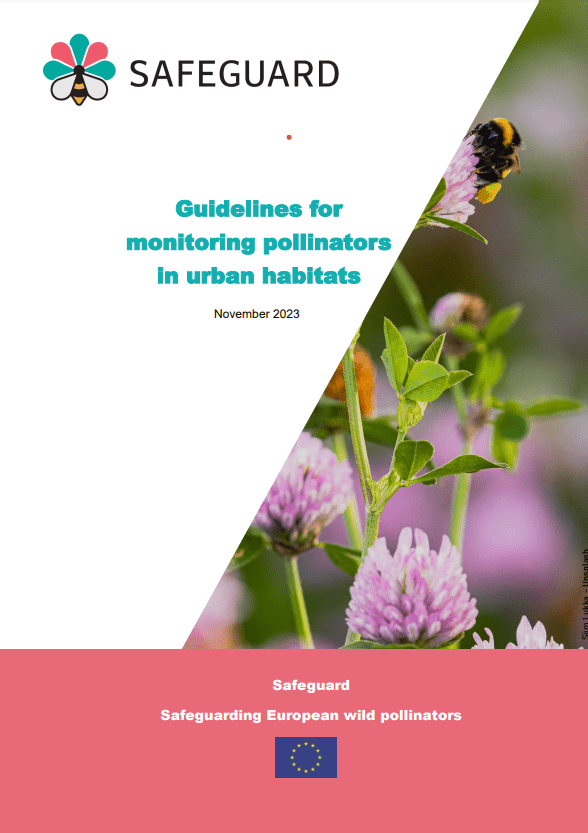Recap webinar ‘Pollinators in the urban environment’
Presentation 1: State of the art science
Katherine Baldock is an associate Professor in Ecology. She gave a broad overview of pollinator research in urban landscapes. Much of her recent research has focused on exploring pollinator interactions in urban landscapes. In her presentation, she shared her findings.
Presentation 2: The national perspective
Sol Ortiz García is Director General at the Ministry of Agriculture and Rural Development in Mexico. She also is the current chair of Promote Pollinators. Unfortunately, the webinar coincided with her obligations in Dubai at the UN Climate Change Conference. Luckily, she was still able to make some time to give an interesting presentation. From a national point of view, she explained that climate change affects pollinators. She used the strategy of Mexico.
Presentation 3: Promoting biodiversity by protecting pollinators in Montreal
Michel Saint-Germain is head of research and collections at the Montreal Insectarium. He explained the goals of the pollinator plan in Montreal (Canada), including their associated actions.
Presentation 4: Pollinator conservation in Tallinn
Tallinn (Estonia) also has a pollinator plan. This pollinator plan involves a pollinator highway. Meelis Uustal works as a nature conservation specialist in Tallin city Government in Estonia. He gave an overview of what they are doing in Tallinn.
Presentation 5: Beeburrows in Utrecht
Susanne Stokvis en Jon Woning presented a wonderful initiative. That is, they together build beeburrows in Utrecht (The Netherlands). The beeburrows are microhabitats for pollinators in the urban environment. Target pollinators are solitary bee species, specifically ground dwelling species.
“We came across a couple success factors: knowledge, participation and realization”
Presentation 6: The Bee City and Bee Campus USA Initiatives
Mace Vaughan shared his knowledge about the Bee City project in the USA, accompanied by Laura Rost. Laura Rost is national coordinator of the Bee City USA and Bee Campus USA. They created a framework in which each community can play to their own strengths, their own interests, their own enthusiasm, and their own creativity to really make the pollinator conservation their own.
An interesting Intermezzo
In an interesting intermezzo Laure Lou Tremblay of IEEP announced the publication of monitoring guidelines for pollinators in cities. These were composed by the Safeguard project.
Panel discussions
After the presentations, a panel discussion on various topics regarding policies, science and local initiatives was held. Next to the presenters, Nicolas Deguines joined the discussion. He is an ecologist, associate professor at the University of Poitiers (France).
Leading questions
- What are critical success factors for good urban pollinator initiatives?
- (How) can urban pollinator initiatives contribute to science and awareness?
- How can other governmental levels support the development of urban pollinator initiatives?
A couple of highlights
Host Martijn, opened the floor for the panel discussion by posing the question which success factors are critical for good urban pollinator initiatives. Nicolas commented on the relation between wild pollinators, honeybees, and beekeeping. He explained that studies show a negative relationship between beekeeping and wild pollinators. He said that it might be important to communicate this more clearly.
Mace explained it is important to have better knowledge about different situations within a city. For example, it could be valuable to explore what those local drivers are, like the density of the city and socioeconomics. Michel touched upon the positions of cities within their environment and the different kinds of landscapes that different groups of pollinators need.
How can we increase the number of suitable habitats for pollinators? Jon explained that urban areas generally tend to be better for colonies than the other way around. Overall, this discussion led to a lot of interesting research topics. Meelis also noted the scarcity of researchers. That is, the need for more researchers and pollinator experts that can identify the species.
Lastly, the panel discussed what would help cities initiatives from a higher policy level. Laura mentioned that we need people to speak to their local politicians, and vice versa. Furthermore, Meelis explained that we always need national pollinator policy, with emphasis on the local authorities. He added two more necessities: good guidance combined with legislation. And if the pollinators are not protected by law, there aren’t any legal obligations to do something about pollinator loss, only voluntary willingness.
Want to know the complete story?
Interested in the full discussion? A recording of the complete webinar is available. Click the link below.
Follow-up
During the webinar we also talked about climate change in relation to pollinators. This could be an interesting topic for the next webinar.
Suggestions?
Which subject would you like to be discussed in the next webinar? Let us know! We appreciate your inspiration.

